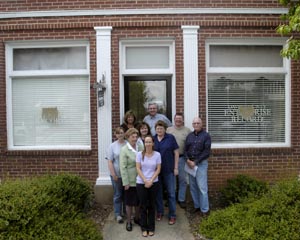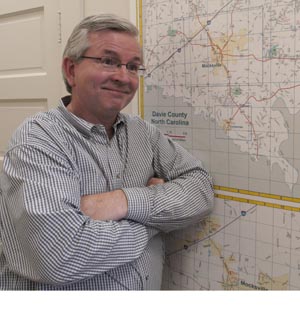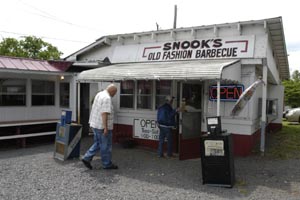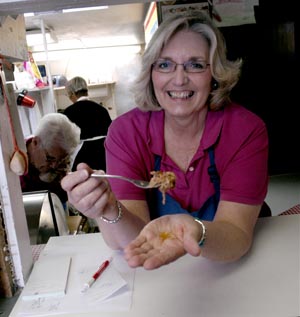By Jock Lauterer
May 2009

Permit me to disabuse you of the notion that all newspapers are failing.
Sure, we all know that many major metro dailies were already in a dismal state prior to the economy tanking last fall, due largely to investor greed and corporate owners taking on too much debt. Since then, their sad demise has been all too well documented.
So take a deep breath and allow me this summer to take you beyond from the beltways, off the interstates and out onto our state’s “blue highways” where we boast at least 190 smaller newspapers, including about 140 weeklies — many of which are still independently owned, or at least owned by small groups which could hardly be called a “chain” in the sense of a company the size of a McClatchy or a Gannett.
I’m interested in this size newspaper, not only because I used to help run a pair of weekly papers and the fact that I teach “community journalism,” but also because of what I’ve observed firsthand over nine summers of workshops statewide from Murphy to Manteo.
In spite of the economy, I’ve witnessed in weeklies (and especially in the non-chain weeklies) a strength of community spirit and a vitality of robust sustainability that will restore your faith in journalism.
So wouldn’t it be instructive to ask: what are these folks doing right? How are these community papers weathering what some are calling “The Great Recession?” Is there a formula, or at least a common denominator among these successful small-town news institutions?
I decided to start with a pair of western Piedmont papers I’ve long admired, the Clemmons Courier and the Davie County Enterprise Record of Mocksville, both owned by the Evening Post Co. of Charleston, S.C., and printed at their sister paper in Salisbury.
WELCOME TO MOCKSVILLE
Turn left off the mind-numbing sameness of 1-40 thirty minutes west of Winston-Salem and almost magically find yourself driving through the soundstage of Meredith Willson’s THE MUSIC MAN: An old-fashioned picture postcard tree-canopied county seat downtown square dominated by a classic 19th century cupola’d courthouse with IN GOD WE TRUST emblazoned over the white columns.
Ringing the square are law offices, eateries and local small-town businesses with names like the coffee shop Kool Beanz. Not a national franchise chain store in the lot.
Big city reporters would call Mocksville “sleepy,” but I find it just right. Diagonal parking along the main street forces traffic to creep and defer to pedestrians. The sweet pace of life makes me jealous. (To my way of thinking, Chapel Hill shot itself in the foot years ago when they did away with diagonal parking on Franklin Street, where pedestrians like me take our lives in our hands trying to get across the 100 block.)
But Mocksville (locals pronounce it MOCKS-vul) feels just the right size to me, several thousand folks who clearly love it here. The New York native who runs the Davie County Senior Center is one, telling me she couldn’t take the frantic pace of nearby Winston-Salem. She loves the town and the neighbors who “let me know right away— no running power equipment on Sunday.
That pretty much says it all — that and the chimes of the Mocksville First United Methodist Church playing old hymns at noon. The kind of place where at the Senior Center a retired Baptist preacher kept wanting to know “What’s your church affiliation?” until I told him I was a fallen-away Unitarian.
BEEN THERE SINCE DIRT

It never fails, but when I find a town like Mocksville, I imagine cloning myself into whoever is lucky enough to run the local community newspaper.
Today it’s Dwight Sparks, who’s been a fixture in the local journalism world for 24 years.
But compared to some other staffers, the editor-publisher of the two papers is a newcomer.
So it didn’t take long to figure out one of the major reasons for their success. In a word, it’s continuity. Just look at this line-up.
Sara Campbell, who just turned 85, started at the Enterprise Record in 1946 and has been there 63 years. Now she just works on Wednesdays when the paper comes out, and some people refuse to buy the paper from anyone other than Sara herself. Dwight tells me she’s said many times that she wants to die at her desk.
Legendary photographer James Barringer, who just turned 70, started in 1965 and been there 44 years. To this day he still takes drop-dead great prep sports photos.
Vivacious General Manager Robin Snow started in 1973 and has been there 36 years — long enough, in her words “to have made photographs of three generations.”
Check out these other employment records:
Clemmons Courier secretary Kay Henderson, 25 years.
Courier sports editor Chris Mackie, 23 years.
Enterprise Record Managing Editor Mike Barnhardt, 24 years.
Advertising Director Ray Tutterow, 19 years.
E-R Sports Editor Brian Pitts, 14 years.
Staffer Jeannie Trotter, 14 years.
Staffer Jackie Seabolt, nine years.
Staffer Linda Morison, eight years.
And Dwight points to two “county correspondents” with even longer track records. In an email, Dwight writes, “Our ‘Advance News’ and “Four Corners New’ writers have both been at it for 50 years.”
So you can safely assume that Dwight runs a “happy shop,” the kind of place people love to work at. Fact is, that’s exactly what they told me. “We love this newspaper,” vowed Robin. “This is our newspaper.”
The bald truth is that it’s legally owned by folks in Charleston, but the psychosocial-spiritual ownership lies here, AND with the enviable reader loyalty exhibited by the approx. 2,000 paying readers of the Courier and the 9,000 paid subscribers of the Enterprise
Record, some of whom insist on buying the paper on Wednesday even though they’ll get it in the mail the next day!
What does this sort of staff commitment gain the papers, I asked? Access and trust, they told me quickly. “I don’t need a press pass,” says Robin. Politicians often time their announcements and law enforcement officials schedule their busts and perp walks to Tuesday afternoon so the local weeklies can get the scoop.
In my humble view, these two papers are perfect examples of the “beloved institution” of which MLK spoke. Dwight observes, “The years we have invested in this community is remarkable.”
The community has noticed. Even in this lousy economy, there are local businesses that advertise with the papers, I learn, just because they “understand they need to support their local newspaper.”
HISTORY ON THEIR SIDE
As Dwight explained, the first paper in the region was the Record, started in 1899 as a Republican Party paper. Next came the Cooleemee Journal in 1901, and then the Enterprise in 1916, the Democratic Party paper. The Enterprise and Record merged in 1958. The Cooleemee paper was significant because it was the first (or one of the first) papers in the state to go “cold type” or offset in 1965. That technology allowed them to run huge photographs that impressed everybody — and to this day, the legacy of the Cooleemee Journal can be seen in the photo-heavy, family-oriented pages of both papers, printed expertly at the Salisbury Post.
RIGHT ON THE SQUARE
Both papers got an A+ on the Lauterer Accessibility Test. That’s where I walk in the front door unannounced and ask to see the editor or publisher. Papers where I can “walk right in” score the highest. Papers with locked newsrooms, keypad entry only, a receptionist Nazi, video cameras and/or a uniformed guard with a gun flunk my test.
Lauterer’s “Virtuous Triangle” goes like this: the more Accessibility the public has, then more likely the community journalist is to feel Accountable, and therefore the more Accurate he or she will try to be.
Here’s another of my litmus tests: is the paper office located centrally downtown so pedestrian traffic is facilitated and even encouraged? Again, Mocksville particularly gets another A.
So I barged right in the office (located smack-dab across the square from the Courthouse), with the old heavy glass and wooden door creaking just like your Aunt Maude’s. It was the homiest sound, and there to greet me with a smile (me, a rank stranger) was Sara, who, when we got to talking about her age, said with a smile, “I’m kind of like that old door; the older I get, the squeakier I become.”
THE HOOVER ADAMS FORMULA
Veteran publisher Hoover Adams of the Dunn Daily Record is famous for saying that his paper’s formula for success is simple: just run lots and lots of photos of local people.
OK, so let’s put these two papers to the Hoover Adams Test.
In a random issue of the Enterprise Record, I counted 154 identifiable faces in that week’s 30-page broadsheet. In the 26-page broadsheet Courier, I counted 160 faces (many ID’ed in the caption too). Multiply 314 times 8 (all the family folks, etc. who care) …and you get 2,512 local people impacted this week alone by just the photos in these papers. Don’t you think they’re gonna want to buy the paper? You betcha.
This is no accident. “We run lots of big pictures of kids,” Robin says. “We can make stars out of middle school and high school kids, and they’re a star for a week.”
Speaking of school coverage, both papers mine their local schools relentlessly. Up at Clemmons, there’s been a 30-year tradition of high schoolers writing “The Titan Tattler” column for the Courier. Students come begging to write for the paper, Dwight says. Repeat: begging.
THE NEWSPAPER OF RECORD
When I asked Dwight and his staff to “assess their assets,” here’s something else he mentioned: “We are the old newspaper of public record,” meaning that they run arrests, court records, fire/police/arrest log, tax liens and legal ads. In fact, the Clemmons Courier, located in the southwestern edge of Forsyth County, gets the county’s legals because as one staffer told me, the major metro paper has “priced itself out of the market…We’re racking up on their stupidity.”
NOT ALL SUNSHINE CARE BEARS AND RAINBOWS

So what are their weaknesses, the greatest challenges they’re facing? Not surprisingly, “Ads are a struggle,” concedes Advertising Director Tutterow, with formerly dependable real estate and automotive advertising down significantly. “They’re just not advertising,” he says.
But the papers are profitable, and Sara Campbell thinks that’s due in part to their relative isolation, particularly Mocksville, located midway between Winston-Salem to the east and Statesville to the west. “We’re the only paper here…and doing well because they’re no competition — and we’re a FAMILY paper too!”
The absentee ownership factor in distant Charleston, S.C., has not been without its speedbumps, with some furloughs and the loss of one part-time ad typesetter. Corporate did move all the classified ad administration to the larger paper in Salisbury, a change that chaffs some staffers used to controlling all their content in-house. But compared to their big-city cousins where entire newsrooms have been decimated, this is nothing and they know it. “As long as we are profitable,” says Dwight, “they leave us alone.” And there is absolutely no prior restraint on news content.
ONLINE
The Enterprise Record has a fairly handsome nothin’-fancy online version, (though I truly detest those winking/blinking adds poking me like a stick in the eye). All the same, there’s veteran photographer James Barringer’s consistently excellent sports photos to anchor the sports page…a local angle on the H1N1 flu, and a lead story about gangs (gangs?!) in rural Davie County. Good reading…until you get to the end of the brief, where it abruptly stops, and then you see “SUBSCRIBE TO THE DAVIE COUNTY ENTERPRISE…ETC.”
Pretty clever marketing, if you ask me. They get you hooked and then jerk away the carrot. Hmmm. How much do they want, I wondered. See? It worked for me and I don’t even live here! I like this online model: a taste for free but you pay for the whole enchilada. If I lived here, I’d shell out for sure.
But truth be told, the e-version of both the Courier and the Enterprise Record don’t hold a candle to the print product. And I think it’s obvious they’re putting their best efforts into their proven, profitable hold-and-fold newsPAPER. The online version, clearly, is a work-in-progress.
A TALE OF TWO CITIES
Dwight is also the editor of the Clemmons Courier 11 miles back toward Winston-Salem. The two towns of Clemmons and Mocksville couldn’t be more different. After driving around Clemmons for an hour looking for its center, I conclude it’s been “Caryized.” There is no there there. What there is is one after another boring homogonous tickytacky developments with predictably boring names: Asbury Place, Meadowbrook, Hampton Way. I’m sure wonderful people live here, but I mourn for this McCity, an exurb to Winston-Salem. Creating a sense of community at the newspaper must be a stretch.

AUTHENTIC NORTH CAROLINA
Leaving the sameness of Clemmons and Driving west on 158 back toward Mocksville, not far from Dutchman’s Creek you come to rolling farmland of nodding blue bachelor buttons blooming — and suddenly there is Andy’s General Store and “Snook’s Old Fashion Barbecue” — and you know that all is still right with the world.
At Andy’s store (glass counters, wooden floors) nothing much has changed in 40 years, and you can still get Moravian Chicken Pies there. Across the highway and over at the corner of Juney Beauchamps Road, Snook’s BBQ joint caused my car to mysteriously do a U-turn.
A gaggle of oddly-arranged clunky little buildings huddle around a parking lot filled with pick-up trucks: a sure barometer recommending a great good place.

Inside the tiny take-out booth, Rita Reavis offers me, an obvious “first-timer,” a forkful of BBQ for my culinary inspection. She did this completely on her own; I did not ask. But I did receive. Truthfully, I wasn’t even hungry, but how’s any true Tar Heel gonna pass up an honest-to-God-greasy-spots-on-the-brown-paper-bag BBQ joint? Exactly. I chowed down.
On the walls inside Snook’s I spot a framed yellowed newspaper clipping from 1984 spotlighting Rita’s dad, Snook, in the Clemmons Courier. And what was the by-line on that full-page feature? Who else? Dwight Sparks!
As I’m leaving, Rita hollers at me, “You come back and have some banana pie, now!”
THE FORMULA
Before leaving Mocksville, I swing through Rich Park, an oasis of a mid-town forested park within the town limits, complete with picnic shelters, nature trails and manicured baseball fields, around the outfield fence stand the large advertising signs from long-time local businesses that made that ball field possible: Graham Funeral Home, Caudell Lumber, O’Reilly Auto Parts… and then my eyes rest on another long-time local business that is a community institution right there amid the others…“Davie County Enterprise Record.”
Why am I not surprised?

